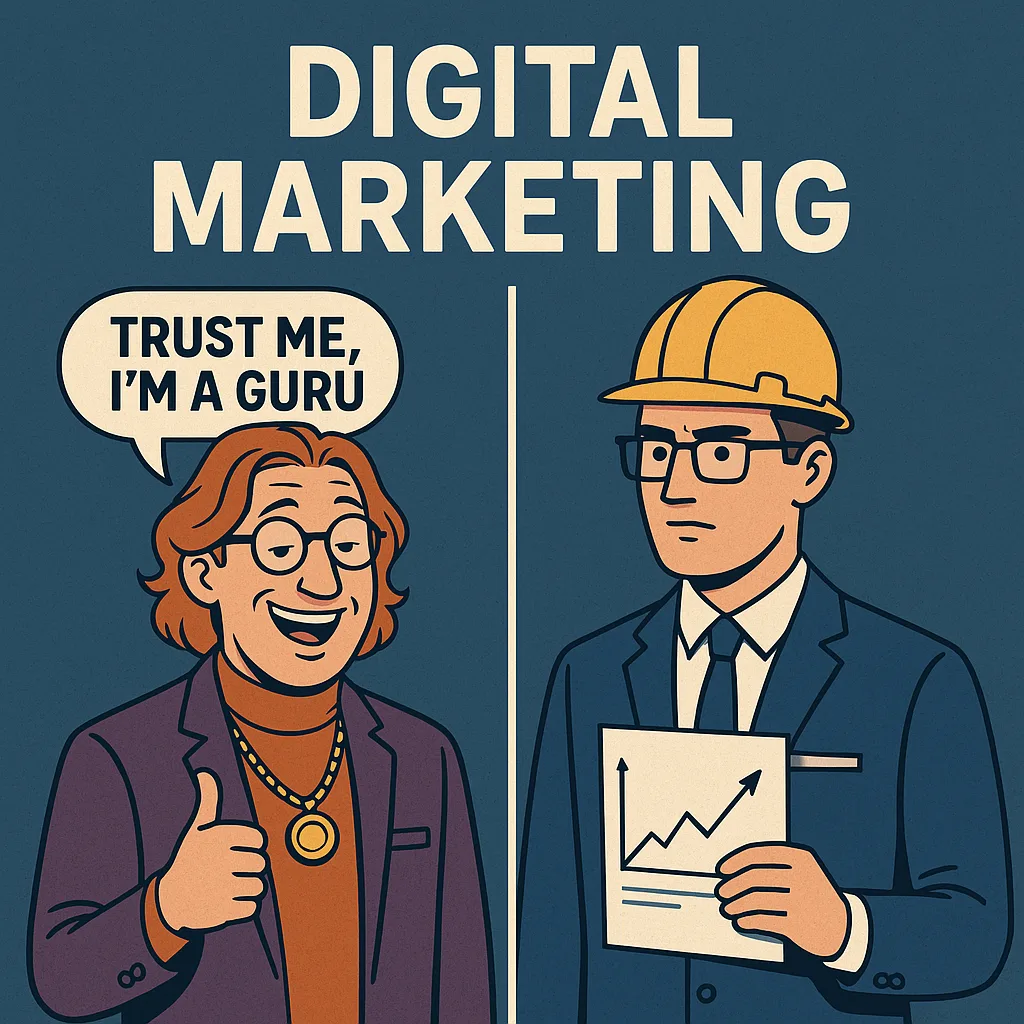
RENOR & Partners è una società di consulenza d'impresa con alti standard qualitativi e con i prezzi più bassi del mercato.
RENOR & Partners S.r.l.
Via Cicerone, 15 - Ariccia (RM)
info@renor.it
Digital marketing: how to distinguish the method from the hoax
Digital marketing: how to distinguish the method from the hoax

This post is also available in:
Italiano (Italian)
For professional reasons, I’ve had to approach the world of Digital Marketing, although I do not, I admit, consider it an area that particularly excites me from a technical point of view. The real satisfaction, in this area, lies in the concrete verification that a methodically thought out, designed and implemented strategy really works and generates tangible results.
From an engineering point of view, the operational activity often consists of relatively ordinary operations: integration of third-party APIs, collection and recording of data in a database, and subsequent processing. Nothing particularly challenging or innovative for those accustomed to designing complex software architectures or distributed systems.
However, it is important to clearly distinguish those who work seriously in Digital Marketing from those who improvise themselves as “experts” or “gurus.” We can identify at least three categories of practitioners who populate the environment today, especially on platforms such as LinkedIn…
The serious and competent professionals
They are data-driven practitioners who are able to combine creativity and analytical rigor. They use advanced tracking tools, implement customized strategies, constantly test solutions through A/B testing and measure each activity based on concrete KPIs. To date, many of them also skillfully integrate AI. Their work is based on a method, not on false sailor promises.
The smoke sellers
Self-proclaimed experts, often with pompous titles invented through neologisms such as Master Coach Marketing Strategistor similar, present content devoid of any substance. They offer free webinars in which they propose a “magic method” applicable indiscriminately to those who sell fruit as to those who develop software or manage complex B2B consulting.
These figures exploit persuasive techniques (attacking only with those who do not even have a clue what digital marketing really is), aggressive sales funnels with emails sent daily and sometimes multiple times in the same day, without providing any real metrics or verifiable documentation.
How to navigate if you are not an expert in the field?
If you are considering adopting digital marketing strategies and are not in the business, or at any rate have never heard of them in depth, I recommend some best practices.
- First always check references, ask for documented success stories and real clients from whom you can go and ask for feedback.
- Always ask for a customized proposal and be wary of pre-packaged solutions; by necessity, the marketing strategy of the carpet salesman who has the store under your house cannot be the same as that of a doctor’s office.
- Assess listening skills because a good consultant will ask you many questions before giving you answers. No one before they know thoroughly what you are about will be able to tell you a marketing strategy to undertake.
- Always analyze the data! Always ask for performance indicators, timelines, estimated costs and expected results. Especially expected results, there is no way you can give them with a reliable margin of prediction (5% – 10%) even before you have published a test campaign. Theoretical data are so much affected by error that they lose all statistical significance. For example, a statement such as “I will bring you 5 leads per day with a 50% margin of error” implies such a wide confidence interval (2.5 to 7.5) that the prediction is almost unusable. In statistical terms, a relative error of 50% indicates a very high variance from the expected value, greatly reducing the significance of the estimate. It is like saying that the probability of rain tomorrow is 50%: such information provides no decision-making advantage over pure chance.. So it is equally likely to be sunny
This last point deserves a separate paragraph….
- Use verification tools; even the use of artificial intelligence to do a “deep search” on the consultant or agency can be useful to protect yourself by asking whether testimonials are self-referenced or given by companies that have been clients. We are all capable of painting ourselves as infallible monsters and vertical professionals, but words must always be backed up by actions.
Despite all these checks and balances, the results may not necessarily come, because at the end of it all ROI also depends on the product or service you are selling. If it has no grip on the market because the market is not interested there is little you can do.
A personal experience
Years ago I attended, through the company I worked for, a conference organized by a well-known marketing agency. The (ticketed) event turned out to be little more than a promotional moment for the agency itself.
Small business owners took turns on stage to testify about their achievements: in some cases, “successes” quantified as 3,000 euros in monthly sales. With all possible respect for the work and vision of other entrepreneurs, it is very difficult to consider these figures an achievement for a business to brag about.
The lack of real training content left me rather perplexed and reinforced my belief that, in marketing, as in other fields, we need to be able to distinguish between professionalism and self-referential storytelling.
What comes to question?
I am continually inundated with LinkedIn requests from people who introduce themselves, even before I have answered them a banal “good morning,” promising resounding results when they don’t even know who I am, they don’t know my company and what it does in the field, and they often present me, in addition to marketing, with services in the IT field that I also offer: a hallmark of the fact that they have applied a simple copy and paste of a message to which they have probably changed only the name of the recipient, having completely glossed over verifying what my credentials and my work are. It’s basically like walking into a pork store and trying to sell the owner a pound of bologna.
Honestly today I don’t spend any more time responding to these “charlatans,” but in times past I used to have fun with them by saying,
“Okay, if you are so sure you are bringing me all these clients by painting yourself as a Master Coach Marketing Strategist, then let’s say I pay you on results achieved. If you are certain that you have this foolproof method, then it shouldn’t be a problem for you if I pay you on results achieved.”
Obviously the message is clearly provocative, but I am of the opinion that to absurd question one replies with an absurd answer; and of course everything deflates immediately.
At this point one wonders? Is it possible that people do not understand what digital marketing is? I mean. The term itself suggests it: take traditional marketing made up of flyers, brochures, and digitize it with search and advertising campaigns. Could you ever give reliance to someone who prints and distributes flyers and promises to increase your sales tenfold without knowing what you are in the business of and how many flyers you intend to print and distribute? Then bearing in mind the fact that closing the lead then also depends on your ability to convert them with a serious and credible presentation of the product or service you are selling.
Let’s have clarity!
In digital marketing, there are different types of campaigns that can be implemented, but they all basically fall into two macro-categories:
- Research campaigns
- Advertising campaigns
Search campaigns are part of that branch called “Direct Marketing.” Your site or landing page appears on search engines as a sponsored result the moment a user searches for one of the keywords you have used to define your marketing campaign.
Advertising campaigns, on the other hand, are part of that branch called “Indirect Marketing.” In this case, there is no interest on the part of a user in searching for a product or service online. This type of campaign can be seen as the digitization of leafleting. How many times have you happened to go to Facebook or LinkedIn and see sponsored posts selling products or services?
Certainly digital marketing has undeniable advantages:
- Today, most people search for information on the Internet with their smartphones
- Of these, most regularly use social
Big brands like Google and Facebook invest in data. They store any interaction you have made with the page to create a virtual profile of you. If you’re googling or even if you’re talking about animals, it’s very likely that you’ll find personalized ads about pet gadgets, pet food.
Big brands know you perhaps better than you know yourself, and this information is gold for those who have to do a marketing campaign because they can profile it to all the users who have those specific interests. You couldn’t do that with leafleting.
In digital marketing, you can also sector by geographic location, but more importantly, the result depends heavily on the budget you decide to invest.
Distributing 10,000 leaflets has a different coverage and response than distributing a million, and underlying this difference is a different economic investment.
This is why I keep recommending that you be wary of those who come with a ready-made “magic solution” without even knowing who you are.
But let us come to the central point of this article….
Why are engineers at an advantage?
You will have realized that the proper channeling of a marketing campaign requires an approach geared toward reading and understanding data.
Well, those with a high technical-information training start from an advantageous position for several reasons:
- An engineer is used to thinking in terms of models, hypotheses and testing. This modus operandi fits perfectly with data-driven marketing, where every action must be able to be measured, tested and optimized over time.
- Where a traditional marketer needs the support of an engineer to integrate a tracking pixel, set up an API call or create a conversion script, an engineer can do it himself, reducing time, cost and margin for error.
- Knowledge of databases, languages such as Python, or data analysis tools (BigQuery, Data Studio, Grafana, etc.) make it possible to build custom pipelines for campaign analysis, optimize funnels, monitor real-time performance, and trigger automated alerts. In addition, artificial intelligence today can automatically place corrections based on the analyzed data. For example, it is possible to use meta APIs to automatically adjust the “pitch” of certain campaigns to make them perform better.
- An engineer knows how to properly size the environment in which landing pages, CRMs; lead scoring or email automation systems run, and this is a really crucial aspect when running high-traffic campaigns. The risk otherwise is to work with an undersized system that burns leads because it cannot serve all incoming requests.
- Optimizing budgets and resources is a priority shared by those who design systems in engineering and those who manage digital campaigns: A/B testing, cost allocation, ROI performance, all require the same logic of efficiency and control.
- An engineer knows how to integrate artificial intelligence-based chatbots that enable 24/7 natural language conversations with all the people who want more information about the product in real time, without latency.
- While many marketers rely completely on prepackaged platforms, the engineer can build taylor-made tools that are perfectly tailored to the needs of the business, avoiding constraints and hidden costs.
Conclusion
In the age in which we live, where information and data are the real wealth but where true expertise is rare, distinguishing those who market seriously from those who build illusions is everyone’s responsibility: entrepreneurs, technicians, consultants and industry professionals.
Digital marketing is not a magic formula, nor is it a set of tools to “turn on and forget.” Rather, it is an ever-evolving ecosystem that requires rigor, study, adaptability and a solid technical foundation. In this context, the contribution of an engineering profile can be instrumental in turning insight into strategy, strategy into process, and process into concrete and measurable results.
My advice is very simple: before relying on the first guy who comes along and promises resounding results, ask questions, analyze the numbers and check the facts, because the first red flag is hidden right behind his promise. And if you feel uneasy about evaluating digital proposals or offerings, confront those with a technical background: it may save you time, resources and, most importantly, disillusionment.
- Want to save the planet? Make them work from home, you moron! - June 22, 2025
- Will AI make people lose jobs? - June 17, 2025
- Evaluation of the level of Blur by Laplacian Variance - June 15, 2025

